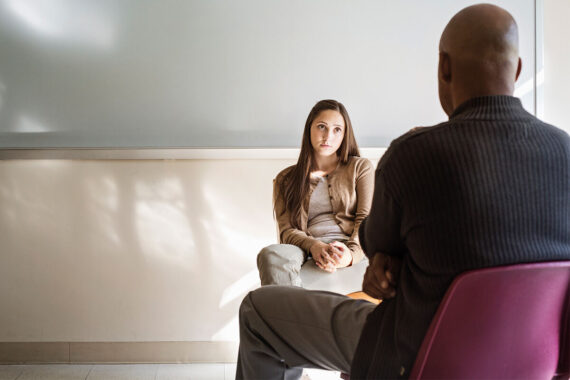CPD: Interpreting NICE guidance on depression in adults

Key points
- Ask directly about thoughts of suicide and self-harm to establish the person’s risk and explore what support they have available
- Offer psychological therapies, including in combination with antidepressant, for a first episode of more severe depression
- For less severe depression, offer talking therapies rather than medication as the first line of treatment
- Be aware that some people with chronic depression may not have sought help before, and can benefit from treatment
- When starting a patient on an antidepressant, explain the potential for increased symptoms including suicidal ideation and agitation during the initial stages, and explain that withdrawal symptoms may occur if the medication is stopped suddenly. Provide written information to take away and document this in the notes
- Build in regular reviews after starting antidepressant treatment; anyone aged under 25, or who you are concerned may be at risk for suicide, should be reviewed after one week
Dr Peter Bagshaw is a GP and NHS Somerset CCG mental health and dementia clinical lead
The recently updated NICE guideline on diagnosis and treatment of depression recommends treatments for first episodes of depression, and provides advice on preventing relapse and managing chronic depression, psychotic depression and depression with a coexisting diagnosis of personality disorder.
As with most NICE guidance, it often recommends gold-standard advice that many of us may not be in a position to implement, because of a lack of access or resources, and is peppered with well-meaning comments about holistic and patient-centred care, which most of us would hopefully take as read.
There are, however, practical comments about frequency of follow-up, managing withdrawal, talking therapies and medication, which we can use in our day-to-day practice.
This article outlines some of the most relevant recommendations for GPs in daily practice.
Ask explicitly about suicidal thoughts
The guidance affirms that GPs should always ask people with depression directly about suicidal ideation and intent. There is now clear evidence that asking about suicide or self-harm will not prompt a person to act – and it is important to establish whether the person is at risk, and what social support they have and what sources of help they are aware of.
Consider combined treatments for more severe depression
NICE now categorises depression as ‘more severe’ and ‘less severe’. ‘More severe’ encompasses moderate and severe symptoms and is defined as scoring 16 or more on the PHQ-9 scale, and ‘less severe’ covers subthreshold and mild symptoms and is defined as scoring less than 16 on the PHQ-9.
For people with a new episode of more severe depression, NICE gives us the option of talking therapies, medication or a combination of both (something I often find particularly useful) as the first-line intervention.
It ranks the effectiveness of the recommended interventions in the following order, from most to least effective:
- Combination of individual cognitive behavioural therapy (CBT) and an antidepressant.
- Individual CBT.
- Individual behavioural activation.
- Medication (usually for at least six months).
- Below these, a further six non-pharmacological interventions are recommended: counselling; short-term psychodynamic therapy; interpersonal psychotherapy; guided self-help; and group exercise.
Click here to read the full article and download your certificate logging 2 CPD hours towards revalidation
Not a Pulse Learning member? Click here to join and gain access to over 400 CPD modules
Pulse October survey
Take our July 2025 survey to potentially win £1.000 worth of tokens

Visit Pulse Reference for details on 140 symptoms, including easily searchable symptoms and categories, offering you a free platform to check symptoms and receive potential diagnoses during consultations.









